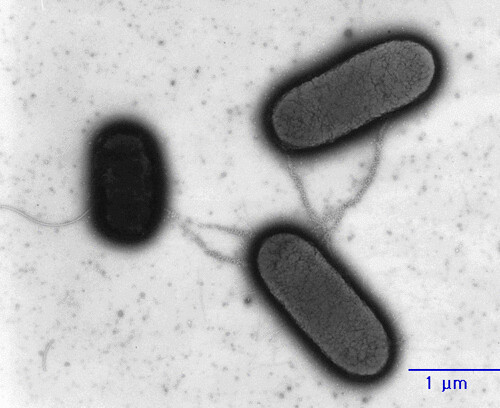...so no blogging. Instead, I'll leave you with a "make sexy time" photo (to steal Borat's phrase):

It's E. coli having sex. Well, actually it's conjugation. Many bacteria have plasmids which are 'mini-chromosomes' (antibiotic resistance genes are often found on plasmids). The bacteria are able to build protein tubes ("pili") and send copies of plasmids to another cell.
- Log in to post comments
More like this
...the signal peptide? Interesting. I'll start at the beginning.
One of the few bright spots regarding the problem of antibiotic resistance is that resistance typically infers a fitness cost to the bacterium, at least initially. In other words, the resistant strain usually grows slower than a…
...the signal peptide? Interesting. I'll start at the beginning.
One of the few bright spots regarding the problem of antibiotic resistance is that resistance typically infers a fitness cost to the bacterium, at least initially. In other words, the resistant strain usually grows slower than a…
Now we come to the third winning question about Microcosm. Kenatiod writes,
Long ago, in bacteriology class, the teacher (an ex-nun at an ex-Catholic college) was telling us about the type "F" pili that are used to pass DNA so coli can have sex. One of the students asked "Why do they call them type…
After Friday's post, I've held off on writing much about the German E. coli outbreak, often referred to by its serotype, O104:H4, or as HUSEC041 (HUS stands for hemolytic uremic syndrome). Having had the weekend to digest some of the ongoing analysis and news reports, here are some additional…

Happy birthday!
Dude: You just blogged that you're not blogging. Now I have cognitive dissonance. Or perhaps you do.
But happy birthday!
Happy Birthday!
Happy Birthday from South Africa :)
Happy birthday.
Happy Birthday
Cheers Dr Mike, Happy B-day
Happy (belated) birthday!!!
Get yourself an E. coli giant plush microbe. My 8 month old girl got Ebola for Christmas. :)
Hey, Mike, Happy Birthday!
Mike
Aw yeah. You better transfer those plasmids for genetic recombination.
biber hapı